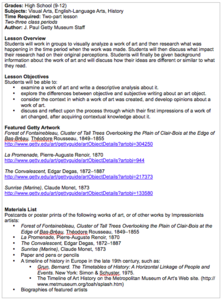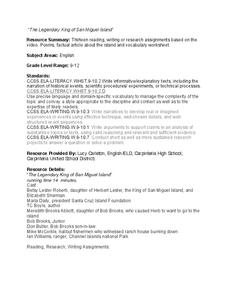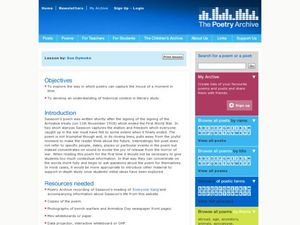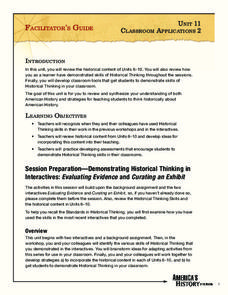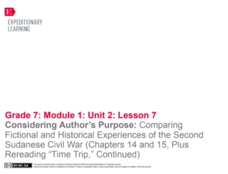Curated OER
Creating Scrolls Based on the Illustrated Tale of Genji
Now these are learning activities full of fun, art, and cultural exploration. Kids consider the art of storytelling through comic book images. They then look at the Tale of Genji as it was written in the 11th century. They discuss...
Historical Thinking Matters
Rosa Parks: 5 Day Lesson
What led to the success of the Montgomery Bus Boycott, and how might historians approach this question differently? This rich series of lessons includes a short introductory video clip, analysis of six primary source documents, and...
TCI
Picking Rusty Gold: Why Do People Buy and Sell Antiques?
Your historical sleuths will work to research the in-depth history of chosen artifacts and will use their research to design a fictional advertisement for an early 20th century item.
Center for History Education
Who Fired the Shot Heard Round the World?
Take a closer look. Young academics become detectives in an engaging lesson on the American Revolution. Scholars work in groups to analyze documents to uncover whether the American colonists or British soldiers fired the first shot at...
Curated OER
Well-behaved Women [and Men] Seldom Make History
Students examine historical context. In this historical perspectives lesson plan, students read and discuss instructor-selected picture book biographies. Students then complete graphic organizers based on the challenges the main...
Curated OER
Teaching the Novel in Context
Students write a context paper. For this teaching the novel in context lesson, students view a primary sources to recreate the cultural and historical context of the novel. Students make the connection between the literary text and...
J. Paul Getty Trust
Historical Context: Discovering a Painting
Class members are presented with the image of a painting and asked to record their first impressions and analysis. They then research the time period in which it was painted and discuss how their research impacted their first impression...
Curated OER
The Art and History of Japanese Calligraphy
Chinese and Japanese calligraphy is beautiful and significant in both culture and tradition. Engage your class in this expressive fine art form through a lesson on using, holding, and creating brush strokes common to Japanese writing...
National Woman's History Museum
Fannie Lou Hamer and Social Activism
Not all heroes wear capes. An impactful lesson focuses on the life and activism of Fannie Lou Hamer during the civil rights movement. Scholars read her speeches and other material, participate in group discussion, and complete a jigsaw...
Newseum
Bias Through History: Analyzing Historical Sources
Young journalists use the E.S.C.A.P.E. (evidence, source, context, audience, purpose, and execution) strategy to evaluate historical and contemporary examples of bias in the news. The class then uses the provided discussion questions to...
Channel Islands Film
The Legendary King of San Miguel: Lesson Plan 3 - Grades 9-12
The documentary, The Legendary King of San Miguel Island, introduces the fascinating tale of Herb Lester, his family, and their life on San Miguel Island. Viewers have an opportunity to expand their study of the island and of Lester's...
The Alamo
A Lesson in Citizenship
What does it mean to be an American citizen? Lieutenant Colonel Commander William Barret Travis believed that it meant honor to country first—even above one's own life. Middle and high schoolers read his final letters from the Alamo that...
Curated OER
Urban Ecosystems 2: Why are There Cities? A Historical Perspective
Second in a series of five lessons, this lesson encourages preteens to consider cities as urban ecosystems. First, they keep a food diary for a few days. They visit the Natrional Agricultural Statistics Service website for current data...
Briscoe Center for American History
Applying the SOAPS Method of Analyzing Historical Documents
Young historians use the SOAPS (Speaker, Occasion, Audience, Purpose, Subject) method of questioning to determine the historical value of primary source documents. The third in a series of five lessons that model for learners how...
Curated OER
A Look Through My Antonia's Eyes
Thoroughly delve into My Antonia by Willa Cather with a plethora of activities. Engage scholars with videos and web sites in this week-long unit that explains the historical context and creates pioneers in the field of research. An...
Museum of the Moving Image
Political Ads in Historical Context
Campaign ads target both timely issues and general themes. Presidential campaign ads from 1952 and 1988 provide class members an opportunity to compare how the topics ads choose to address can dramatically influence election outcomes.
James Madison Memorial Fellowship Foundation
Those "Other Rights:" The Constitution and Slavery
Did the United States Constitution uphold the institution of slavery, or did it help to destroy it? Young historians study Article 4, Section 2, Clause 3 of the Constitution and evaluate the rights of slaveowners as they compared to or...
Curated OER
Everyone Sang - Moods in Poetry
Start by reading the poem "Everyone Sang" by Siegried Sassoon. The archive also houses an audio clip, so consider playing that instead of reading it aloud. After hearing the poem twice, middle and high schoolers will discuss a list of...
Annenberg Foundation
Analyzing Artifacts
If only a mask could talk! Using the interactive tool along with historical thinking skills, pupils uncover the meaning behind the various materials the resource presents. History becomes more relevant as the artifacts tell their stories...
Annenberg Foundation
America's History in the Making: Classroom Applications Two
Reading between the lines helps discover important information! The 11th lesson of a 22-part series on American history has scholars use historical thinking skills to uncover the deeper meaning behind the words on a page. Using backward...
Walden Woods Project
19th Century Lessons for 21st Century Lives
The words of Henry David Thoreau on Civil Disobedience seem particularly relevant today, as are his writings and those of other transcendental thinkers who ask what it mean to live deliberately and what are the responsibilities of...
Stanford University
Arabian Peninsula
How do cultural differences affect our view of history? The assessment geared towards high school historians, focuses on the credibility of primary sources. Young academics analyze a text and complete short answer questions to determine...
EngageNY
Comparing Historical and Fictional Accounts: Second Sudanese Civil War (Chapters 14 and 15, Plus Rereading “Time Trip”)
Let's compare! One pair of scholars adds to the Salva/Nya anchor chart by gathering evidence about the characters from chapters 14 and 15 of A Long Walk to Water. The rest of the class pairs work on adding to the Survival anchor chart....
Curated OER
Seeing Art in Historical Context: An Activity to Promote Visual Literacy
Students consider works of art in their historical context. In this art in historical context lesson plan, students are encouraged to think about and record their prior knowledge of the historical period and to make inferences about the...






![Well-behaved Women [and Men] Seldom Make History Lesson Plan Well-behaved Women [and Men] Seldom Make History Lesson Plan](http://content.lessonplanet.com/resources/thumbnails/268494/large/odqwmdy4lmpwzw.jpg?1414466400)

